Since Sunday, I have been noodling on what to write this week. Lots of possibilities...
Want to know where "Free Willy" is? I don't. Interested in music, neuroplasticity, and the brain? Too academic for now. Curious about the impact of diminishing humanities majors in college? Me too; just not ready to write about it. Wanna know about the myth of the "alpha" dog? Check your inbox next week.
So I sit here spinning through content - even starting some articles, but I keep returning to one thing.
Adam Sandler.
To be clear, I am not his biggest fan. Sure, Waterboy had some funny moments, and I don't think I will ever forget Bob Barker getting punched in the face by Happy Gilmore. Frankly, while entertaining, his movies and style of comedy have never been my cup of tea or something I particularly respected.
Until now.
Adam Sandler received the highest honor in comedy this past weekend, the Mark Twain Prize for Humor, at the Kennedy Center.
Yep, the guy who brought you classics such as Lunch Lady Land, Billy Madison, and Deuce Bigalow; Male Gigolo, has won America's highest literary prize.
Really?! Adam Sandler and Mark Twain don't belong in the same sentence, much less the same category.
Yep, this part Sunday. Drew Barrymore, Jennifer Aniston, Dana Carvey, and Conan O'Brien honored and roasted him at the event. And did it in front of a packed house.
In typical Sandler style, he threatened to show up for the event in gym shorts and a tee shirt, but thought better of it when his wife threatened him.
Sandler cut his teeth at New York University and rose to stardom at a very young age on Saturday Night Live - where he spent five years and became a household name.
Yes, his recent work in The Hustle and Uncut Gems has generated some Oscar buzz. And yes, his films have earned over three billion dollars at the box office, but we are talking about the guy who played Bobby Boucher, right?
Every critic agrees, his movies are bad! Really bad. In fact, they are so bad that when Billy Madison was released, a writer from the Long Island Newsday said the film was, "the end of the world as we know it."
Sandler's response? "I jumped in a car, snuck into a bunch of theaters and watched audiences roar."
You see, Adam Sandler doesn't care what you, I, or any other naysayer thinks. The only people he cares about of the ones sitting in a theatre.
In a recent article in the New York Times, Sandler states, "I think the reason (bad movie reviews) didn't hurt me is because so many in this room have made me feel good about what we did together." Sandler added that all the important people in his life "make me feel like the critics didn't know what the hell they were talking about."
In this respect, I have something to learn from Adam.
Critics are everywhere, in print, online, in your face, and behind your back. Everybody has an opinion, and it usually involves you (and me) being wrong, and them being right.
This is also true in our jobs.
It's festival season, and judges abound everywhere. While their information may be correct and of pure intent, they are unaware of the obstacles you have overcome and the progress you have achieved. They hold you to the same standard regardless of your enrollment, economics, or rehearsal schedule. Perhaps more important than anything...
They are not your primary audience. They aren't even in the top three.
Are the kids smiling and making progress? Are the parents happy and attending concerts? Is your principal's office a distant and unfamiliar place? If the answer to these three questions is yes, then as far as I am concerned, you are an award-winning teacher.
Sandler's material may change over the years, but his personality has not. His primary mission is to make you laugh. "He's not looking for pats on the back," says Spade, who remains a close friend. "He's already won."
When recently asked about the lack of critical acclaim, Sandler is quoted as saying, "I'm not particularly talented. I'm also not particularly good looking. And yet I am a millionaire."
So, at your next contest, as you take the stage and acknowledge the panel of adjudicators in the back of the auditorium, say to yourself, "I may not be the best teacher here, or have the best ensemble, and yet my true audience LOVES me."
During this time of contest, Adam Sandler reminds us that is what and who matters.
Have a great week,
Scott
p.s. I will hold a free student leadership event for your students on Monday, April 3rd, 7:00-8:00 pm ET. Send as many students as you like. Details are forthcoming, but let your (aspiring) leaders know to save the date.









